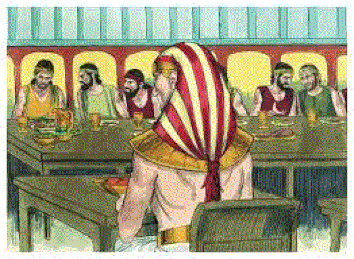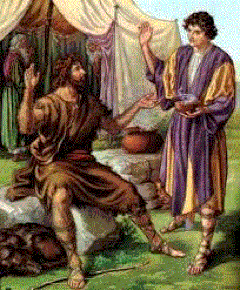
So it was not you who sent me here, but God; ...
(Gen 45:8)
The story of Joseph lends itself to many midrashes. The sages of Israel have always paralleled the life of Joseph with that of Messiah and indeed they were right. As Joseph, Messiah was favored by His father and sent to check on His brethren who rejected His leadership. They put Him in an underground pit for three days and sold him to the Gentiles for silver. Whereas the Torah text says 20 pieces of silver, some talmudic sources say 30. As Messiah does till this day, Joseph ruled among the Gentiles until such a time when His brothers came to Him. After testing their hearts, Joseph came out from under his Egyptian appearance and revealed himself. Just like with Joseph of old, today the Jewish people see Messiah as a foreign leader. There will come a time when He will take off his 'Christian Greco-Roman' garb and reveal Himself to His brethren as the true King of the Jews. May it be soon Abba, even in our days!
I believe that the lives of the patriarchs are blueprints for us to learn from. That is why in these weekly newsletters, I have mostly been looking for the ethical values in their lifestyle, and the life of Joseph is rich with examples for us to emulate.
It seems that Joseph lived his life according to Murphy's law, 'If anything can go wrong, it will!' Anyone in his situation could have easily given in to despondency, discouragement, bitterness and anger, but he did not. In this, we again see the life patterns that were adopted by his father Jacob, his grand-father Isaac, and great-grand-father Abraham. It is the opinion of this writer that it was not because of a cosmic divine predestination to be the custodian of the covenant that Joseph extolled these virtues, but that it was because he extolled these virtues that Hashem chose him. I believe this principle applies to all the patriarchs as well as with us today: virtue precedes acknowledgment just as obedience precedes blessing. As the Master taught, it is our meekness; it is our hunger for righteousness, mercy, purity of heart and peace-making, which brings down HaShem's blessing.
"How blessed are the poor in spirit! for the Kingdom of Heaven is theirs. "How blessed are those who mourn! for they will be comforted. "How blessed are the meek! for they will inherit the Land! "How blessed are those who hunger and thirst for righteousness! for they will be filled. "How blessed are those who show mercy! for they will be shown mercy. "How blessed are the pure in heart! for they will see God. "How blessed are those who make peace! for they will be called sons of God. "How blessed are those who are persecuted because they pursue righteousness! for the Kingdom of Heaven is theirs. (Mat 5:3-10)
Many people teach that Yeshua is angry with His people, the Jewish people, for what happened 2,000 years ago. Many even, consciously or sub-consciously, exonerate themselves from the guilt of the Holocaust by saying that it was HaShem's punishment on the Jews who deserved it for their rebellious disobedience (so they say). It is strange because HaShem's anger with the wicked only lasts three or four generations, not 2,000 years. It is His showing of grace and forgiveness for the sake of the righteousness of their fathers which lasts for thousands of generations,
... showing grace to the thousandth generation, forgiving offenses, crimes and sins; yet not exonerating the guilty, but causing the negative effects of the parents' offenses to be experienced by their children and grandchildren, and even by the third and fourth generations." (Exo 34:7)
Some of the most beautiful verses in the Bible (in my opinion) are these:
Then Yosef hurried out, because his feelings toward his brother were so strong that he wanted to cry; he went into his bedroom and there he wept. Then he washed his face and came out, but he controlled himself as he gave the order to serve the meal. (Gen 43:30-31)
At last Yosef could no longer control his feelings in front of his attendants and cried, "Get everybody away from me!" So no one else was with him when Yosef revealed to his brothers who he was. He wept aloud, and the Egyptians heard, and Pharaoh's household heard. (Gen 45:1-2)
In these verses about Joseph, I hear and I see my Messiah' tears of love and compassion, as well as of desire to be with His people again. Even so, I believe that today Messiah weeps with Joseph. He weeps for joy at the knowledge that the time is soon coming when He will be reunited with His people to observe the Feasts together with them again. The sad question here is that, as the Torah mentions that 'the Egyptians heard, and Pharaoh's household heard.', do the nations today hear the tears of Messiah for His people?
There is a rationale that helped Joseph to not give in to seeking vengeance at the time when he was in a position to do so mightily; a rationale that helped him to live by the apostolic command,
Never seek revenge, my friends; instead, leave that to God's anger; for in the Tanakh it is written, "Adonai says, 'Vengeance is my responsibility; I will repay.' " (Rom 12:19; Deut 32:35-36)
What is this rationale? It is expressed in these very poignant words:
... don't be sad that you sold me into slavery here or angry at yourselves, because it was God who sent me ahead of you to preserve life. The famine has been over the land for the last two years, and for yet another five years there will be neither plowing nor harvest. God sent me ahead of you to ensure that you will have descendants on earth and to save your lives in a great deliverance. So it was not you who sent me here, but God; and he has made me a father to Pharaoh, lord of all his household and ruler over the whole land of Egypt. (Gen 45:5-8)
In essence, Joseph did not attribute all that happened to him, to his family situation, but rightfully to HaShem. He did not blame his brothers nor his family, he only saw HaShem in all that happened to him.
May we also, with Joseph, the patriarchs, Yeshua, Paul, Peter, James, John, all the others l
earn to attribute both the seemingly positive and the seemingly negative phases of our lives to Hashem, so that we do not grow roots of bitterness against friends and families.
May we also learn to see HaShem's hand in all that happens to us, and realize that whether we see it or not in this life, that it was in order to preserve life. As the apostle said,
... we know that God causes everything to work together for the good of those who love God and are called in accordance with his purpose;
(Rom 8:28)
R' Gavriel Lumbroso


 RSS Feed
RSS Feed